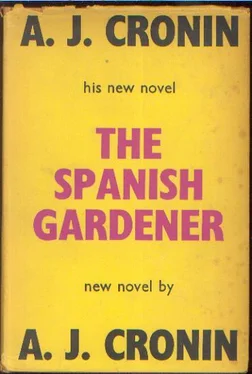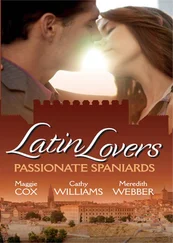Archibald Cronin - The Spanish gardener
Здесь есть возможность читать онлайн «Archibald Cronin - The Spanish gardener» весь текст электронной книги совершенно бесплатно (целиком полную версию без сокращений). В некоторых случаях можно слушать аудио, скачать через торрент в формате fb2 и присутствует краткое содержание. Жанр: Классическая проза, на английском языке. Описание произведения, (предисловие) а так же отзывы посетителей доступны на портале библиотеки ЛибКат.
- Название:The Spanish gardener
- Автор:
- Жанр:
- Год:неизвестен
- ISBN:нет данных
- Рейтинг книги:4 / 5. Голосов: 1
-
Избранное:Добавить в избранное
- Отзывы:
-
Ваша оценка:
- 80
- 1
- 2
- 3
- 4
- 5
The Spanish gardener: краткое содержание, описание и аннотация
Предлагаем к чтению аннотацию, описание, краткое содержание или предисловие (зависит от того, что написал сам автор книги «The Spanish gardener»). Если вы не нашли необходимую информацию о книге — напишите в комментариях, мы постараемся отыскать её.
The Spanish gardener — читать онлайн бесплатно полную книгу (весь текст) целиком
Ниже представлен текст книги, разбитый по страницам. Система сохранения места последней прочитанной страницы, позволяет с удобством читать онлайн бесплатно книгу «The Spanish gardener», без необходимости каждый раз заново искать на чём Вы остановились. Поставьте закладку, и сможете в любой момент перейти на страницу, на которой закончили чтение.
Интервал:
Закладка:
Then he had been transferred to Europe and the steady succession of his "moves" had taken them to Stuttgart, Liege, Ancona … places which, he told her bitterly, any normal, loving woman would have found attractive in his company. Was she pining for her homeland? The thought helped him at times, salvaged in some degree his wounded pride. And when he was granted an extra leave he took her, and Nicholas, now aged three, back to America. Alas, it was there that he received the final blow. One day she had come into the rented New York apartment and, with faintly hollowed cheeks and drooping head, had said that, for the time being, she must leave him. The strain of their life together had broken her nerve—she must be alone, for some months, to readjust herself.
He had felt himself turn cold, sick with a longing to crush her brutally in his arms. Sweeping aside her pleading he had delivered his ultimatum coldly:
"If you go I'll not take you back. With me it's all or nothing."
She made no reply. But he could still see her shadowy eyes, holding the eternal enigma which had always tortured him. He went on, biting his lip until it bled.
"You'll have no money, no position. And no hand, none, in bringing up our child."
"Have I got that now?" she answered sadly, and, turning, went slowly from the room.
Here, in the embrasure of this Spanish house, with his head buried in his hands, he could still see her slender, swaying figure, dressed in grey, could still breathe in the warmth and perfume of her presence. Well, she was gone, completely eradicated from his life; when last, indirectly, he had heard of her she was rooming in a woman's boarding-house in New York, working—for a pittance, he presumed—in a communal welfare centre. So be it, then. At least he had what she had not, their son. All that love which she had spurned was now transferred, lavished upon Nicholas. He adored the boy, he would not deny it, and he would cherish him, hold him close to his heart, always … always.
For long moments he remained there, bowed and brooding, the lines of his face drawn back in hungry longing, his lips twisted in something like a sneer. Suddenly there came the sound of laughter from without. Recalled, he raised his head, gazed heavily through the window, perceived José and his son, carrying the watering can along the garden path together, sharing a joke which apparently amused them both.
The Consul's cheek twitched as though, unexpectedly, he had suffered another wound. Abruptly he rose, went to the door and, controlling his voice, called out:
"Nicholas, come in, my dear. Come in at once."
Chapter 4
IT WAS ten o'clock on Sunday morning, some three weeks later, and the Consul sat restfully at breakfast with his son in the sunlit alcove of the dining-room. Outside, the spring, exquisite as a bride, was unfolding a day so lovely that little Nicholas had longed to take his toast and honey on the open verandah. But his father, wary of the early deceitful air, had chidingly shaken his head. Instead, he had ordered Garcia to set a small table by the window. Here, at least, the boy could view the bright flashing of the scarlet tanagers amongst the mimosa shrubs and hear the tender, far-off pealing of the church bells.
"Father .. ." From time to time Nicholas had been glancing at the Consul who, in his most favourable humour, was now agreeably occupied with a light Larranaga cigar and his two-day-old copy of the Echo de Paris —he judged only this journal worth his attention, and had his friend Halevy send him a copy once a week. "Father, I should like so much to go to the pelota game this afternoon."
Slowly the Consul lowered his paper.
"The pelota game?" he repeated without comprehension.
"Yes, Father." The blood had rushed into the small boy's cheeks but he summoned his courage and went on. "It is a kind of handball which they play here. Very fast and exciting. All the towns on Costa Brava are in the league. And today Huesca, the champions, are meeting San Jorge."
Harrington Brande was gazing in amazement at his son's eager face. Gradually his expression relaxed.
"Well, well!" he exclaimed mildly. "So Garcia has been talking to you. What nonsense goes on here when I'm at the office! Tell me, where and when is this famous game to take place?"
"At the Recreo, Father," Nicholas breathed, not daring to confess that Garcia was not his informant, "four o'clock this afternoon. Oh, do let us go."
The suspicion of a smile hovered about the Consul's mobile lips. It gratified him that his dear child should voluntarily seek out his companionship.
"Well." He appeared to consider. "If you take your tonic now … finish your Spanish composition … and rest for an hour after lunch, then we shall see."
"Oh, thank you, thank you, Father." Nicholas jumped up, delighted.
At half-past three that afternoon the two set off, Nicholas in the highest spirits, Mr. Brande exhibiting a mood of indulgent good humour. The Consul knew nothing of sport. Once at Ancona he had thrown the first pitch at a baseball game arranged between teams drawn from visiting United States naval forces, and again, some years later at Knocke, he had presented the prizes at the local sailing club's regatta. Now however, in an amused fashion, he subscribed to something of his son's expectation.
They parked the car in the Plaza and by traversing a network of narrow streets behind the fruit market came out at the Recreo which, Mr. Brande noted with faint misgiving, stood in a low part of the town. It was, indeed, an indifferent enclosure, fenced by a wooden paling stuck over with bills advertising the local theatre and the forthcoming April corridas at Barcelona. Nevertheless, the Consul willingly enough permitted himself to be tugged by Nicholas to the front row of the tribuna , a backless wooden plank which faced directly on the concrete court where a man in shirtsleeves, with a pot of red paint, was freshening up the lines.
They were early. Only a few youths had gathered on the top tier of benches where, with their feet up, they were smoking, chewing dried locust pods, joking loudly, and arguing in a regrettably vulgar manner. From time to time, other spectators, with hands in their pockets, strolled in, mostly young men and boys who took their places at the rear and joined in the general rowdiness. The Consul reflected that at least they were some distance from these cads and had adequate space in which to avoid contact with them. But, alas, no sooner had four o'clock struck upon the Marina clock than the real aficionados broke in upon the tribuna —a crowding, chattering mass of humanity, pushing and elbowing into every available vacant space. In no time at all, the benches were packed, the aisles full of squatting human forms. A stout little man in a battered black sombrero and shiny dark suit, with half an onion in one hand and a hunk of bread in the other, squeezed himself into position beside the Consul and, with a friendly grin, sharpened his clasp-knife upon his boot and began noisily to eat. Small whistles broke out all over the arena accompanied by a slow rhythmic stamping of feet and cries of " Ole …Ole … Ole! "
"They'll soon start now, Father. Shall I explain about the game?" Nicholas leaned forward and pointed eagerly across the court. "You see these two walls. They're set exactly opposite each other, about two hundred feet apart. One's called the frontis and the other the pareo de rebote . These red lines on them show the space where the ball must strike. And the red lines on the court itself—they call it the concha —mark out the same thing. If the ball bounces outside of them, it's a fault and counts a point to the other side."
While the Consul stared in stiff curiosity, the boy rattled on.
Читать дальшеИнтервал:
Закладка:
Похожие книги на «The Spanish gardener»
Представляем Вашему вниманию похожие книги на «The Spanish gardener» списком для выбора. Мы отобрали схожую по названию и смыслу литературу в надежде предоставить читателям больше вариантов отыскать новые, интересные, ещё непрочитанные произведения.
Обсуждение, отзывы о книге «The Spanish gardener» и просто собственные мнения читателей. Оставьте ваши комментарии, напишите, что Вы думаете о произведении, его смысле или главных героях. Укажите что конкретно понравилось, а что нет, и почему Вы так считаете.












